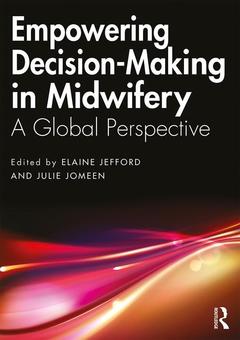Description
Empowering Decision-Making in Midwifery
A Global Perspective
Coordinators: Jefford Elaine, Jomeen Julie
Language: English
Subjects for Empowering Decision-Making in Midwifery:
Keywords
Intrapartum Analgesia; midwifery; Elective Caesarean Section; decision-making; Maternity Care Professionals; theory; Fetal Heart Rate; practice; Spontaneous Vaginal Birth; law; Midwife Woman Relationship; legal; Professional Accountability; ethics; Midwifery Practice; risk; Midwifery Care; reflection; Maternity Care Provider; critical thinking; Midwifery Education; birth; Clinical Practice; challenges; Midwifery Models; optimal midwifery decision-making; Student Midwives; midwifery academics; Maternity Services; midwifery governance; Perinatal Mental Health; Fetal Heart; SDM; Vaginal Birth; Shared Decision Making; Health Professionals; Maternity Care; Role Breadth Self-efficacy; Moral Case Deliberation; Childbirth Continuum
Publication date: 09-2019
· 17.4x24.6 cm · Paperback
Publication date: 09-2019
· 17.4x24.6 cm · Hardback
Description
/li>Contents
/li>Readership
/li>Biography
/li>
Decision-making pervades all aspects of midwifery practice across the world. Midwifery is informed by a number of decision-making theories, but it is sometimes difficult to marry these theories with practice.
This book provides a comprehensive exploration of decision-making for midwives irrespective of where in the world they practice or in which model of care. The first part critically reviews decision-making theories, including the Enhancing Decision-making Assessment in Midwifery (EDAM) tool, and their relevance to midwifery. It explores the links between midwifery governance, including professional regulation and the law, risk and safety and decision-making as well as how critical thinking and reflection are essential elements of decision-making. It then goes on to present a number of diverse case studies, demonstrating how they interrelate to and impact upon optimal midwifery decision-making. Each chapter presents examples that show how the theory translates into practice and includes activities to reinforce learning points.
Bringing together a diverse range of contributors, this volume will be essential reading for midwifery students, practising midwives and midwifery academics.
1. Midwifery and Decision-Making Theories 2. Midwifery Regulation: global perspective 3. Legal Issues in Midwifery Care 4. Doing good: Ethics of decision-making in midwifery care 5. Risk within maternity and how this impacts on midwives’ decision-making 6. Midwifery Abdication 7. Critical thinking 8. The use of reflection in midwifery practice to inform clinical decision-making. 9. Decision-making in perinatal mental health: what are the challenges? 10. Stress urinary incontinence in pregnancy and midwives decision-making 11. Enhanced decision-making in midwifery - care for pregnant and parenting adolescents 12. Deciding to transfer. Tools to navigate the crossroads of expectations, values, and models of care, when making transfer decisions at a midwifery birth center 13. Decision-making around pain and its management during labour and birth 14. Midwives’ decision-making for fetal heart monitoring 15. Third Stage of Labour and Optimal Cord Clamping: Implications for midwives decision-making 15. Choices after traumatic birth 17. Stillbirth and midwives decision making: what are the challenges? 18. Midwifery decision-making: Feeling safe to support women’s choice in the maternity care environment 19. Woman centred-care and shared decision-making in midwifery care 20. Collaborative Decision-Making from a Woman’s Perspective 21. The Doula, Midwife partnership. Friend or Foe – how to work collaboratively 22. Collaborative decision-making between midwives and doctors 23. Do personality traits impact upon Midwives decision-making and practice? 24. Proactive behaviour in midwifery education and practice: a pre-request for shared decision-making 25. Developing the decision-making skills of Student Midwives in an Undergraduate Midwifery Programme in New Zealand.
Elaine Jefford is a midwifery academic and researcher at Southern Cross University, Australia. Elaine is a UK-trained nurse and midwife who immigrated to Australia in 2005. Her primary research focus is within the field of midwifery decision-making and abdicating one’s professional accountability, the impacts of this in relation to risk, safety and quality of care provision on maternal and neonatal health, midwives and the midwifery profession. She has also been involved in national and international curriculum development in midwifery.
Julie Jomeen is a Professor of Midwifery and Dean of the Faculty of Health Sciences at the University of Hull, UK. Julie currently co-leads a Research Group for Maternal, Reproductive Health within the Faculty. A key focus of her work is exploring issues of perinatal mental health and psychological health in childbearing women. Other research interests include women’s choice and decision-making and practitioner decision-making.
These books may interest you

Sustainability, Midwifery and Birth 160.25 €

Law and Ethics for Midwifery 53.83 €


